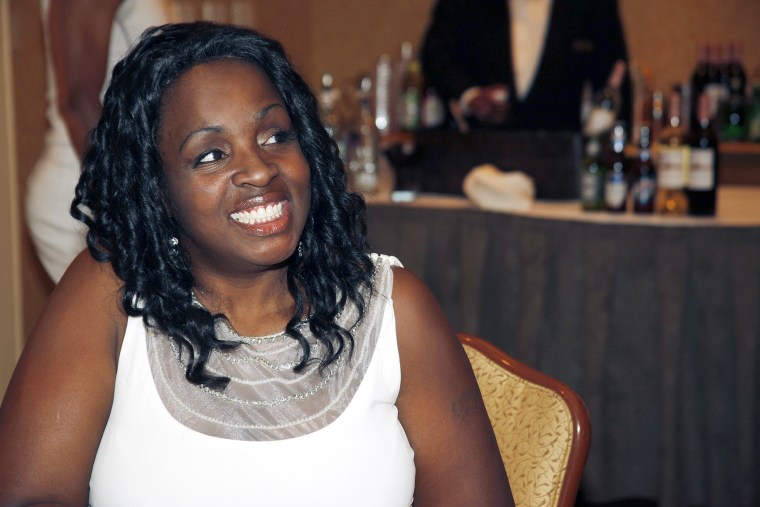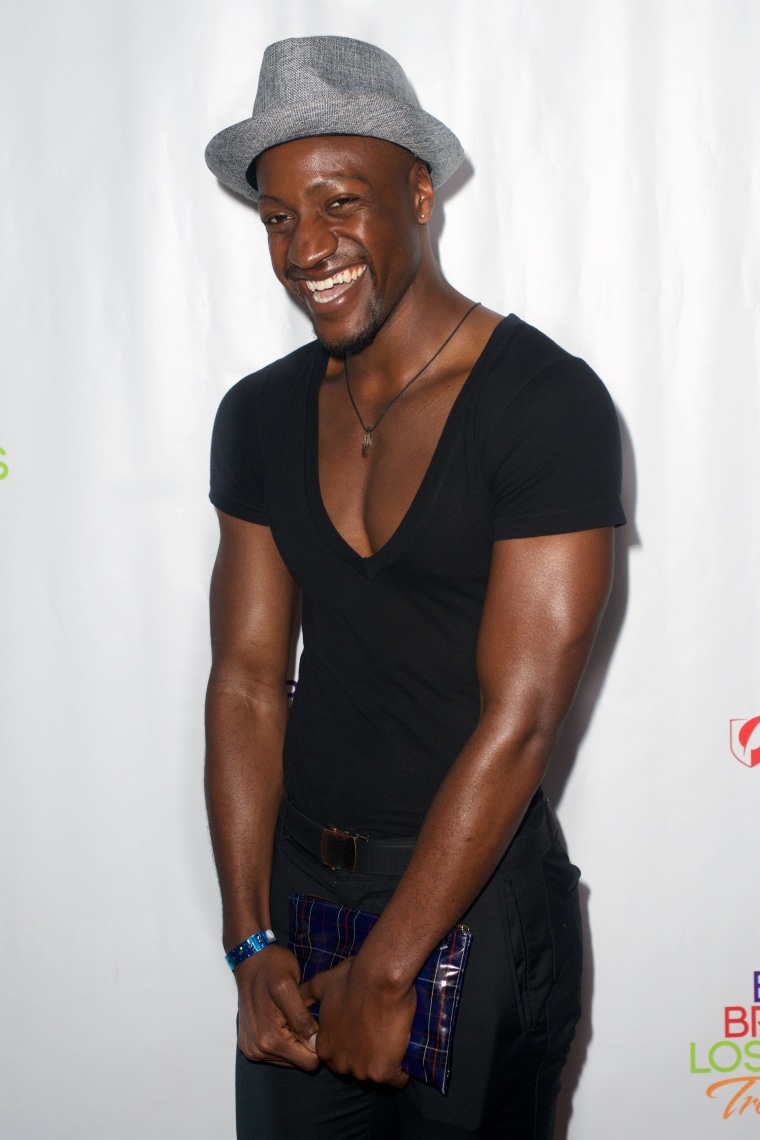When you’re in the business of making people laugh, you’re always at the mercy of your audience. Will your jokes elicit smiles? Will your material resonate with the crowd? These are questions all comics ask themselves. But what happens when your own identity becomes an obstacle to career progress?
For two Black, LGBTQ stand-up performers -- Sampson McCormick and Tammy Peay -- their intersectional identities have presented additional hurdles.
“I [show] up first as a Black man,” McCormick, who was recently named one of BuzzFeed's 10 Out Comedians That Will Make You Laugh Today, told NBC OUT. “But I also perform with some masculine and some feminine characteristics."
“I had to show up so well as a person, so people would want to see me. I’m a Black man first, but as a gay man, others will say, ‘People don’t want to see that.'"
Audiences, however, are not always receptive to McCormick's LGBTQ material. “Black people in particular will call you out on it," he explained.
During McCormick's historic Joyful Noise tour in 2013, where he became the first out, Black comedian to play the Howard Theatre, he came to a poignant realization.
“I had to show up so well as a person, so people would want to see me. I’m a Black man first, but as a gay man, others will say, ‘People don’t want to see that.'"

Echoing McCormick's sentiment is Tammy Peay, a popular comedian and New York-based LGBTQ advocate.
“You have to be well-rounded enough to do a show," Peay told NBC OUT. "Not everybody is going to be comfortable with LGBT jokes. That's why I reach out to the mainstream in much of what I do."
McCormick grew up in rural North Carolina, was raised by a single mom and struggled with the racism and homophobia of the Deep South. He began doing his routines, as he described, on the "smallest of stages." He gradually fine-tuned his craft, eventually reaching such storied locations as the White House, Hollywood’s Famous Comedy Store and Broadway.
McCormick's talents attracted the notice of such household names as Whoopi Goldberg, Margaret Cho, Angela Bassett and Bruce Vilanch, and he has appeared on MTV, BET, VH1, OWN and other major networks. As an author, he’s written two popular tomes and has been invited to lecture at Harvard University. A new documentary, "A Tough Act To Follow," and an upcoming tour, Shea Butter, are the latest iterations of his work, with more television projects on the way.
“At Pride celebrations, when it comes time to book talent ... they will find a coked-out disco queen right out of rehab before they’ll sign up a Black, LGBT comedian."
In contrast to McCormick's rural upbringing, Peay, a preacher's daughter, spent her childhood in New York City. After becoming streetwise in the concrete canyons of Brooklyn and Queens, she became a corrections officer, patrolling the corridors of Rikers Island, the city’s notorious Bronx prison. However, Peay always knew making people laugh, rather than cry, was her life’s calling. Her critically-acclaimed career includes film, television and stage performances, including Roger Omeus’ "Finding Me: The Series," the first-ever Pride concert at Carnegie Hall and the weekly "Talk ‘N Tea" online radio show.
Their intersectionality gives McCormick and Peay a unique perspective, but balancing identity and appeal is at times a razor-sharp tightrope walk.
"It's all about capturing the audience," McCormick said. "That means we have to understand what they want. That isn't always easy. Striking the right approach is often a challenge."
Even within the LGBTQ community, support for these performers isn’t always easy to come by, and both artists agreed that’s part of the larger problem.
“At Pride celebrations, when it comes time to book talent,” Peay lamented, “they will find a coked-out disco queen right out of rehab before they’ll sign up a Black, LGBT comedian."
“I’m not a shady person,” McCormick opined, “I’m not apt to throw shade, but sometimes our community throws shade at us.”
"We have to really start loving each other. What if all gay men got behind Harmonica Sunbeam, like they do for Rihanna?”
As emerging voices on the comedy scene, out comedians of color can be game-changers. When Wanda Sykes publicly acknowledged her sexual orientation, it was seen as another door-opening event for other LGBTQ personalities and reflected the ethos held by Peay and McCormick.
“Mainstream has been ready for LGBT artists. We need a new kind of Def Comedy Jam that paves the way for minority artists,” McCormick said. “We have no choice, this is our game.”
Before that road can be traveled, the LGBTQ community most grow and adapt, becoming truly supportive of its own creative community, Peay cautioned.
“The whole self-loathing attitude of gays towards other gays needs to change. We have tipped the Richter scale on shade ... We are so busy doing shade, that we forget to support each other," Peay said. "We have to really start loving each other. What if all gay men got behind Harmonica Sunbeam, like they do for Rihanna?”
Another sticking point for LGBTQ comedians is the ongoing tendency in some comedy circles toward booking stereotypical LGBTQ players, rather than more realistic, accessible ones. The perception that over-the-top depictions of gay people will draw more audiences is fallacious, according to Peay and McCormick.
“Unless you’re a sidekick drag queen or have a face full of makeup ... you’re going to get passed by," Peay said. "We have to be the extreme forms of gay -- cartoon-like -- to be accepted. Why can’t we just be who we are?”
Historical patterns of demeaning LGBTQ people play a role in this as well, McCormick added. “Our community has been taught that we have lesser value than everybody else. This translates into how well we do as artists.”
For McCormick and Peay, being on stage is the sine qua non of their professional lives. No other experience even begins to approach what performing does for them.
“When the door opens, I’m ready," Peay said. "No sex, no drugs, no high is like what you get when you’re on the stage. You have a relationship with that stage only another performer can understand.”
“Being denied a booking is like taking my drug away," McCormick explained.
Despite the challenges thrown their way, Peay and McCormick remain positive about their careers and their industry.
“Black dollars, gay dollars, are really powerful dollars,” McCormick said. “It’s going to happen. We’re going to get there.”
“Sooner or later,” Peay concluded, “we will all be where we belong.”
